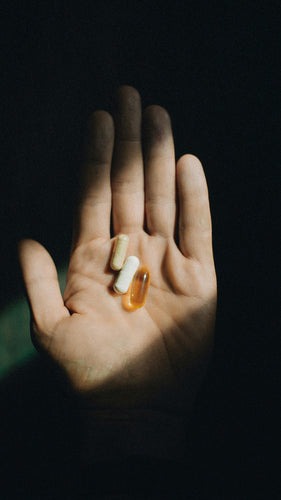People who have been prescribed a course of antibiotics can take probiotics while following their treatment depending on their doctor's advice. For the best effects, it is important that the antibiotic and probiotic are taken as far apart from each other as possible.
Antibiotics and probiotics – a great example of yin and yang. Both help us live a healthy, vital life. Many people first hear of probiotics in relation to antibiotics.
Your doctor might have prescribed you an antibiotic and with that encouraged you to take a probiotic. When completing a course of antibiotics, taking a high quality probiotic is essential to your gut health and overall wellbeing.
What are antibiotics?
Antibiotics are an amazing medical invention and resource. Antibiotics destroy the bad bacteria that make us sick. The tricky thing with antibiotics is that they don’t distinguish between bad bacteria and the good bacteria that live in your gut and affect your health in multiple ways.
Our gut microbiome is made up of billions of good bacteria that assist in many vital processes in the body, including digesting food and absorbing nutrients, detoxification, aiding the immune system and even cognitive function. Unfortunately, by doing their job, antibiotics also destroy much of the good bacteria in our gut, which our body needs to properly function.
It has been scientifically studied that within the first 48 hours of antibiotic treatment, the good bacteria in your gut microbiome diminish significantly, leaving room for harmful bacteria to flourish. This can lead to symptoms including antibiotic-associated diarrhea, bloating, stomachache and nausea.

A study conducted by the Division of Gastroenterology-Hepatology at the University of Maastricht in The Netherlands, published in The American Journal of Gastroenterology, showed that the intake of a multispecies OMNi-BiOTiC® probiotic significantly reduced diarrhea-like bowel movements in healthy volunteers receiving amoxycillin compared to the control group.
Multiple rounds of antibiotic treatment in a short time period amplifies these effects and can even lead to a permanent reduction in the diversity of your gut microbiome. Science Daily shared a study in October 2018 that was conducted by the University of Copenhagen and the Steno Diabetes Center Copenhagen that shows that the composition and function of gut bacteria can recover after antibiotic treatment in healthy people.
In addition and more noteworthy in this context, the study found that after six months, the gut still lacked nine common beneficial bacterial species.
A rich and diverse gut microbiome is considered to promote health and help prevent chronic disease. Poor diversity of the gut microbiome is a characteristic feature of chronic disease, including obesity, diabetes, asthma and gut inflammatory disorders.
Restoring Your Body’s Microbiome
It is essential to take a high-quality probiotic supplement when completing antibiotic treatment in order to restore your gut microbiome with good bacteria and maintain its diversity. It is best to start taking a probiotic within the first 48 hours of starting your antibiotic treatment.
Make sure to space out taking your antibiotic and your probiotic. Try to leave as much time as possible each day between taking your antibiotic and your probiotic. If you take your antibiotic and probiotic too close to each other, you run the risk that the antibiotic will kill the good bacteria that you are feeding your body by taking a probiotic supplement.
In terms of how long to take a probiotic to repair your gut microbiome due to antibiotic treatment, a good rule of thumb is: take a probiotic for each day you take an antibiotic and then continue for the same amount of days you took the antibiotic for.
For example, if you would be prescribed a ten-day antibiotic treatment, you would take a probiotic for at least twenty days.
Keep in mind that probiotics have many health benefits, and therefore you should strongly consider adding a probiotic supplement to your daily wellness routine regardless of whether or not you recently completed an antibiotic treatment. Fact is that a healthy life starts with a healthy gut.

Which Strains of Probiotics Should Be Taken While On Antibiotics?
Antibiotics destroy all bacteria, the good and the bad, in our gut microbiome. Therefore, after a course of antibiotics, the main goal is to replenish the good bacteria and restore the diversity in your gut microbiome. You can do so by taking a multispecies and multistrain probiotic supplement.
Institut AllergoSan, the Competence Center in Microbiome Research, located in Austria has developed a probiotic that is specifically designed to restore a healthy gut microbiome after completing a course of medication.
OMNi-BiOTiC® AB 10 is a medically relevant probiotic that consists of ten specifically selected bacterial strains that have demonstrated to maintain the diversity of a healthy microbiome, support healthy bowel movements and boost the body’s immune response.
It has also shown in clinical studies to protect your body against aggressive pathogens, including Clostridium Difficile, which among other pathogens, has a stronger chance of flourishing in the body after the gut microbiome has been damaged because of an antibiotic treatment. Clostridium Difficile and other harmful pathogens are key drivers in antibiotic-associated diarrhea.
A study conducted by Goldenberg et al., published by the Cochrance Systematic Review in December 2017, found that OMNi-BiOTiC® probiotics reduced the risk of Clostridium Difficile-associated diarrhea by 60% in patients who have recently completed a course of antibiotics.
In many countries, including Germany, doctors prescribe or recommend OMNi-BiOTiC® AB 10 or another high-quality probiotic with an antibiotic treatment because they recognize how important it is to support your gut microbiome when completing a course of antibiotics.
Many hospitals give patients OMNi-BiOTiC® AB 10 to protect against the infection of Clostridium Difficile, which is prevalent in hospitals and can severely weaken a patient.
Foods for Antibiotics Treatments
You can further support your gut microbiome and overall organism by eating foods that are rich in probiotics (fermented foods, yogurt, miso, kombucha) during and after a course of antibiotics.
While it’s certainly beneficial to eat foods rich in probiotics, it’s important to recognize that this cannot be compared to taking a high-quality, multispecies and multistrain probiotic.
Probiotic foods typically only include one or two bacterial species and strains. You’re not getting as deep and targeted benefits as you would with a medically relevant, multispecies and multistrain probiotic supplement like OMNi-BiOTiC®.
In addition, the probiotic bacteria in certain foods have to fight to survive the acidic environment in your stomach. Many probiotic bacteria in food are killed by your stomach acid before they can reach your intestines where they will be most effective.
OMNi-BiOTiC®, on the other hand, is manufactured in a powder form that must be dissolved in water to ensure that up to 90% of the probiotic bacteria survive the passage through the stomach to the intestines.
Add Prebiotic Foods to Your Diet
Taking this into consideration and staying on the food mindset, it might be a better idea to increase your intake of prebiotic foods when going through antibiotic treatment. Prebiotics are the food for the probiotic bacteria.
When you add more prebiotics into your body, you’re providing nourishment for your probiotic bacteria so that they can become strong and complete their many, vital tasks in your body. Foods that are rich in prebiotics include leafy greens, bananas, oats and flax seeds.
Completing a course of antibiotics implies that your body is fighting an illness. During this time, it’s important to strengthen your body by eating whole, organic foods that are rich in nutrients and vitamins, healthy fats, and complex carbohydrates. It’s also helpful to increase your intake of Vitamin C, which will further boost your immune system.
First and foremost, you want to make sure though that your gut microbiome is healthy and functioning properly so that your body can absorb all the healthy goodness that you’re taking in.
FAQ’S:
1. Should I take probiotics while on antibiotics?
Yes, taking probiotics during antibiotic treatment can help replenish beneficial gut bacteria and mitigate side effects like diarrhea.
2. When should I start taking probiotics during antibiotic treatment?
It's recommended to begin taking probiotics within the first 48 hours of starting antibiotic treatment to support gut health.
3. How should I space out taking antibiotics and probiotics?
To maximize efficacy, take probiotics at least one hour before or after your antibiotic dose to prevent the antibiotic from killing the beneficial bacteria.
4. How long should I continue taking probiotics after finishing antibiotics?
A general guideline is to continue taking probiotics for the same number of days as the duration of your antibiotic treatment to help restore gut microbiome balance.
5. Are all probiotics suitable during antibiotic treatment?
Not all probiotics are equally effective. It's advisable to choose a high-quality, multispecies, and multistrain probiotic supplement designed to support gut health during and after antibiotic use.
6. Can probiotics prevent antibiotic-associated diarrhea?
Yes, certain probiotic strains have been shown to reduce the risk of antibiotic-associated diarrhea by restoring gut flora balance.
7. What is Omni-Biotic AB 10, and how does it help?
Omni-Biotic AB 10 is a clinically studied probiotic supplement containing ten bacterial strains that support gut health and immune function during antibiotic treatment.
8. Can I take probiotics with other medications?
Omni-Biotic probiotics are designed to be compatible with most medications. However, it's always best to consult with a healthcare provider before starting any new supplement.
9. Should I take probiotics with food or on an empty stomach?
Probiotics are most effective when taken on an empty stomach, such as first thing in the morning or before bedtime, to ensure they reach the intestines alive.
10. Are there any side effects of taking probiotics?
Probiotics are generally safe, but some individuals may experience mild digestive discomfort, such as bloating or gas, especially when first starting supplementation.




